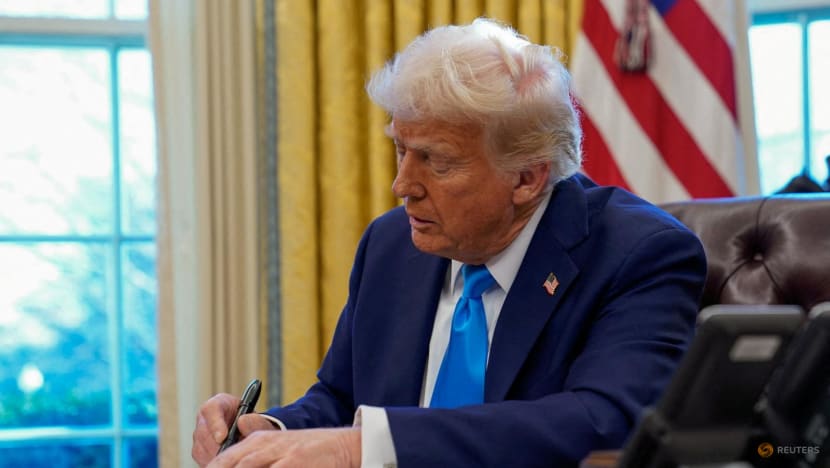Trump’s bid to end birthright citizenship a ‘big mistake’: Legal experts, immigrant advocates
One rights advocate calls it an attack on people who came to the US seeking a better life.

US President Donald Trump signs a document in the Oval Office at the White House in Washington, US on Feb 4, 2025. (File photo: REUTERS/Elizabeth Frantz)

This audio is generated by an AI tool.
NEW YORK: United States President Donald Trump’s bid to restrict birthright citizenship is a “big mistake” that defies American law, said immigrant rights advocates and legal experts.
Trump signed a deluge of executive orders after being sworn into his second term just over two weeks ago, seeking to put his stamp on matters ranging from immigration to public health.
Among the slew of divisive directives is a move to end automatic American citizenship, and reserve it only for babies born to at least one citizen or permanent resident parent.
The ban would not just affect children born to undocumented parents, but also children of foreigners legally in the country.
VIOLATING THE US CONSTITUTION
But observers have asserted that this would be a violation of the US Constitution, which provides that anyone born on American soil is considered a citizen. The measure was ratified in 1868 to ensure citizenship for former slaves after the Civil War.
Some American states have since filed lawsuits challenging Trump’s effort to rescind birthright citizens.
Two federal judges in as many days have blocked the move, accusing the Trump administration of ignoring the rule of law for political and personal gain.
District Judge John Coughenour in Seattle on Thursday (Feb 6) put Trump’s order on pause for the duration of lawsuits brought by four states and an immigrant rights group challenging it.
His ruling followed one by a federal judge in Maryland in a separate but similar case.
The ruling extends the pause on the order until a higher court overturns it, a successful appeal by Trump’s administration, or the legal process plays out, which could take months or even years, said observers.
“There is really no question in my mind that this executive order is illegal,” Jennifer Gordon, professor of law at Fordham University, told CNA.
“It goes against the clear language of the Constitution, and it goes against 125 years of decisions by the Supreme Court when other challenges were made.”
The main birthright citizenship case is from 1898, when the Supreme Court ruled that the son of lawful immigrants from China’s Guangdong province was a US citizen by virtue of his birth in 1873 in San Francisco.
The man, Wong Kim Ark, had been denied re-entry to the US in 1895, after returning from a trip to China.
SEEKING A BETTER LIFE
Trump’s attempts to rewrite the law also target people on tourist, student, and work visas like the H1B, which allows US employers to hire foreign workers in so-called specialty occupations.
In 2022, Washington-based think tank Pew Research estimated that the US had over 30 million immigrant workers. Of these, a third - or 22.2 million - were on legal work visas like the H1B.
Trump's executive order would apply to all of them, if it overcomes the legal pushback.
Rosa Diaz, an immigrant rights advocate in Harlem, New York, noted that Trump's move is yet another attack on people who came here seeking a better life.
“That is just nonsense,” she said. “If you're born in the United States, you're entitled. You are an American.”
Some observers argued that it would take a Constitutional amendment to end birthright citizenship, which would then require two-thirds of the US Congress and approval by three-quarters of state legislatures.
But the cumbersome process would likely take years. No amendment has passed since 1992.
The other route to legitimising the order would be via the Supreme Court, but that would involve overturning its own precedent.
“It's conceivable that the Supreme Court could adopt a theory well outside the mainstream and overturn its own precedent and decide the opposite,” said Fordham University’s Gordon.
“I think that's unlikely, but I wouldn't say it's impossible.”
















